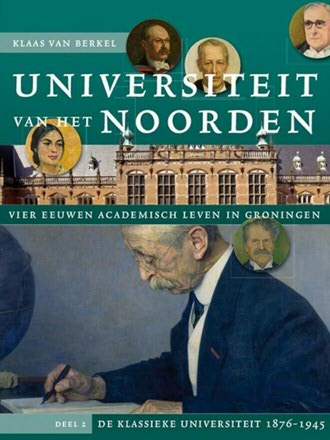The university that reinvented itself

On 27 October, historian Klaas van Berkel will present the second part of De Universiteit van het Noorden [University of the North], a three-part history of four centuries of the University of Groningen. The second part of the trilogy (1876-1945) revolves around the transformation of a university into a community of over three thousand students, a process that continued throughout the German occupation.
But the history of the UG almost ground to an abrupt halt in 1876. ‘It looked like the end of the line’, says Van Berkel, referring to the turbulent period that nearly resulted in the University’s downfall. The book follows developments during the rescue in 1876, through a Second Dutch Golden Age around 1900, into the Depression, and closes with the end of the German occupation in 1945.
Traditional university
At the end of the dramatic year of 1876, Groningen worked enthusiastically to create the type of university that now no longer exists: a traditional university. Professors were the leaders in this community, students had very little to do with society at large, and academic knowledge was thought to be good for one’s moral development. Economic conditions in the 1920s and 30s left their mark on the University’s recovery. ‘In a year that Groningen has won its second Nobel Prize, and after decades of relative post-war prosperity, we tend to forget that things used to be very different for Dutch universities.’ In this respect, De Universiteit van het Noorden recounts a history common to all Dutch universities.
Trilogy to be completed in 2020
The first part of De Universiteit van het Noorden was presented to Rector Magnificus Elmer Sterken in September 2014, the year in which the University celebrated its 400th anniversary. This first part is an account of how the Mediaeval Aduarder Kring evolved into a university that nearly folded in the latter half of the nineteenth century due to falling student numbers. Part three will cover the past seventy years, and is due to be published in 2020. In this final part, Van Berkel will explore the most recent years, paying special attention to the increasing internationalization of university life in Groningen. Van Berkel: ‘In recent years, we have seen the University do something that it has done repeatedly throughout the centuries: reinvent itself.’
Klaas van Berkel (1953) studied history and philosophy in Groningen and has worked for the UG since 1988. He has written about the history of the natural sciences in the Netherlands since 1580, the Groningen university during the German occupation of the Netherlands, and the Royal Netherlands Academy of Arts and Sciences (KNAW), of which he has been a member since 1997. Van Berkel has occupied a chair named after the Groningen humanist Rudolf Agricola since 2008.
More information
Contact: Prof. Klaas van Berkel. De Universiteit van het Noorden is published by Uitgeverij Verloren in Hilversum.
| Last modified: | 13 August 2021 3.16 p.m. |
More news
-
19 December 2024
Konstantin Mierau new Vice Dean Faculty of Arts
The Board of the University of Groningen has appointed Dr Konstantin Mierau as Vice Dean of the Faculty of Arts, effective 1 January 2025. Dean Thony Visser and Managing Director Sander van den Bos are pleased with the appointment and look forward...
-
16 December 2024
Jouke de Vries: ‘The University will have to be flexible’
2024 was a festive year for the University of Groningen. Jouke de Vries, the chair of the Executive Board, looks back.
-
10 December 2024
Time will tell: what tree rings reveal about the past
Ancient DNA analysis of bones, teeth, or plants can reveal family connections, population movements, and domestication pathways. Pınar Erdil tells more about it.
